Cockatiels are popular pet birds known for their social and curious personalities. However, like other animals, they can also get sick and show signs of distress.
One of the most common and alarming symptoms cockatiel owners may notice heavy or labored breathing. This can indicate a severe health problem that requires immediate veterinary attention.
In this article, we will explain some of the possible causes of cockatiel breathing heavily, how to spot other signs of illness in your feathered friend, and what to do if you suspect your cockatiel has a respiratory issue. We will also answer some frequently asked questions about cockatiel health and care.
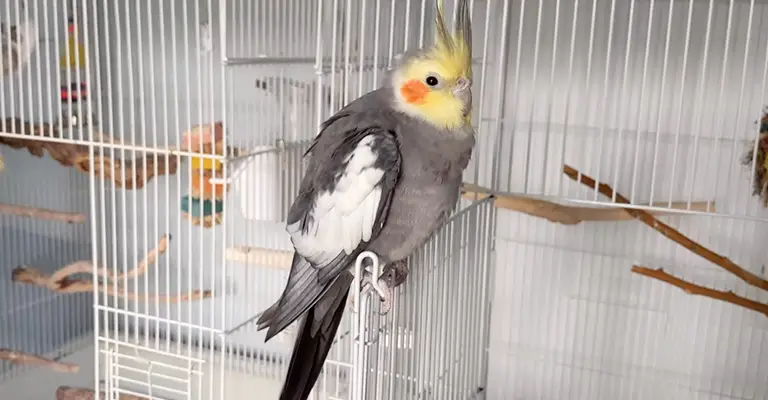
What Causes Cockatiels to Breathing Heavy?
Many factors can affect your cockatiel’s breathing and cause it to become heavy or labored. Some of the most common ones are:
Respiratory Infections
Cockatiels can contract various bacterial, viral, or fungal infections that affect their respiratory system. These can cause inflammation, mucus buildup, or fluid accumulation in their lungs or air sacs, making it harder for them to breathe.
Some examples of respiratory infections in cockatiels are psittacosis (also known as parrot fever), aspergillosis, avian influenza, and mycoplasmosis.
Foreign Objects
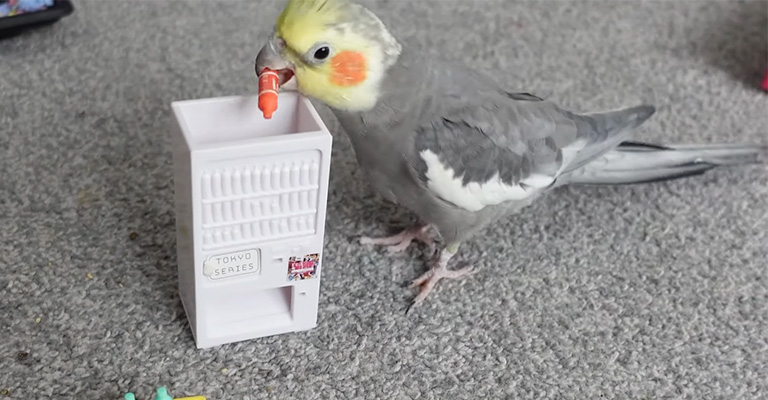
Sometimes, your cockatiel may accidentally inhale or swallow something that gets stuck in its throat or crop (a pouch where they store food).
This can obstruct their airway and cause choking or difficulty breathing. Some everyday foreign objects that can cause this problem are seeds, toys, feathers, or tumors.
Environmental Factors
Your cockatiel’s breathing can also be affected by the quality of the air they breathe. If the air is too dry, dusty, smoky, or polluted, it can irritate their lungs and cause inflammation or infection.
Some sources of harmful air for your cockatiel are cigarette smoke, incense, Teflon fumes (from overheated non-stick cookware), cleaning products, aerosols, insecticides, and mold spores.
Stress

Cockatiels are sensitive birds that can get stressed by various factors such as loud noises, sudden environmental changes, predators, or lack of social interaction.
Stress can cause your cockatiel to breathe faster or heavier than usual to cope with the situation. However, chronic stress can also weaken their immune system, making them more prone to infections or diseases.
Other Health Problems
Sometimes, heavy breathing in cockatiels can indicate an underlying health issue that is not directly related to their respiratory system.
For example, heart disease, liver disease, kidney disease, obesity, or hormonal imbalances can also affect your cockatiel’s breathing and oxygen levels.
How to Spot Signs of Illness in a Cockatiel?
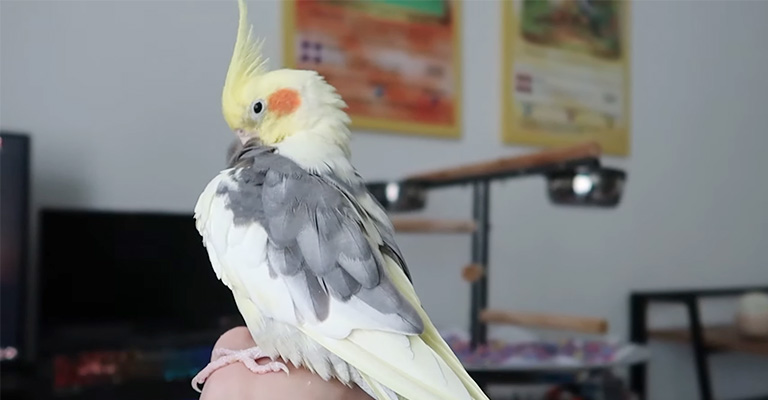
Spotting signs of illness in a cockatiel is crucial for timely veterinary intervention and ensuring the bird’s well-being. Here are some points with detailed explanations on how to identify signs of illness in a cockatiel:
Changes in Behavior
Observe any significant changes in your cockatiel’s behavior. This can include increased aggression, lethargy, decreased appetite, excessive sleepiness, or a sudden decrease in vocalizations. Any abnormal or uncharacteristic behavior may indicate an underlying health issue.
Changes in Eating Habits
Pay attention to your cockatiel’s eating habits. A decreased appetite, sudden weight loss, or difficulty swallowing can be signs of illness.
Conversely, increased thirst or frequent water intake may indicate a problem. Monitor food and water consumption and consult a veterinarian if you notice any changes.
Respiratory Distress
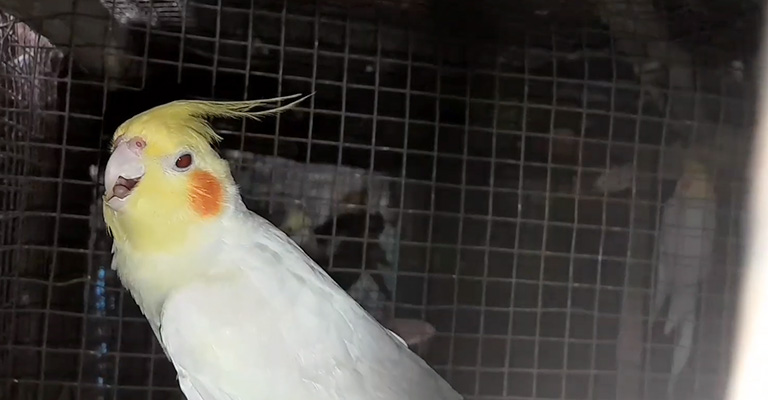
Respiratory issues are common in cockatiels and can be severe. Watch for signs such as wheezing, labored breathing, open-mouthed breathing, sneezing, nasal discharge, or coughing. These symptoms may suggest respiratory infections, allergies, or other conditions requiring veterinary attention.
Changes in Droppings
Regularly check your cockatiel’s droppings for any abnormalities. Healthy droppings consist of well-formed feces, a white part (urates), and clear urine.
Be vigilant for changes in color, consistency, or frequency of droppings, as well as the presence of blood, mucus, or a foul odor, which can indicate digestive or urinary problems.
Feather Problems
Observe the condition of your cockatiel’s feathers. Feather abnormalities such as excessive molting, bald patches, fluffiness, discoloration, or disheveled appearance may indicate health issues. Excessive preening or self-plucking can be signs of stress, illness, or discomfort.
Changes in Vocalizations
Cockatiels are known for their vocalizations. Please pay attention to any changes in their vocal patterns. If your cockatiel becomes unusually quiet, stops singing, or produces unusual or distressed sounds, it may indicate an underlying health problem.
Eye and Nose Abnormalities
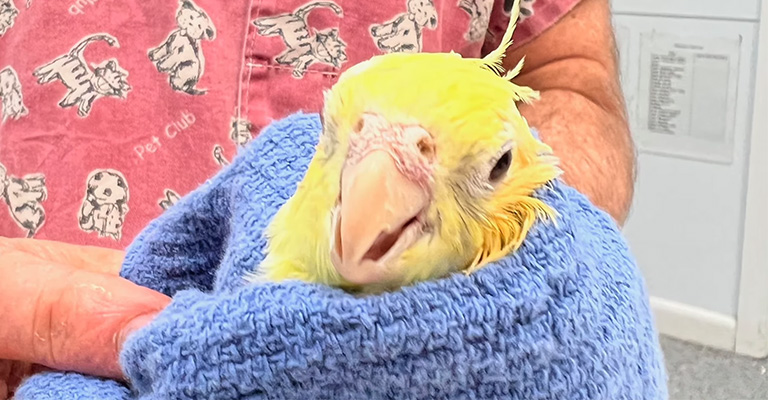
Inspect your cockatiel’s eyes and nostrils for abnormalities. Swollen, red, or watery eyes, discharge from the eyes or nostrils, crusted or blocked nostrils, or excessive blinking can be signs of infections, allergies, or other issues requiring veterinary attention.
Balance and Coordination Issues
Watch for balance or coordination problems in your cockatiel. Difficulty perching, unsteady movements, head tilting, or repeated falls can indicate neurological or musculoskeletal issues that require professional evaluation.
Changes in Plumage
Observe changes in the appearance of your cockatiel’s feathers. Loss of feather quality, dullness, thinning of feathers, or delayed or abnormal feather growth can be signs of illness, malnutrition, or other health problems.
Changes in the Feet and Beak
Inspect your cockatiel’s feet and beak for abnormalities. Swollen feet, sores, or abnormalities in nail growth can indicate infections or foot-related issues. Overgrown or discolored beaks may be signs of nutritional deficiencies or beak disorders.
It’s important to note that individual cockatiels may exhibit different symptoms, and some illnesses may have overlapping signs. If you notice any concerning changes in your cockatiel’s health, it’s recommended to consult an avian veterinarian promptly.
Regular veterinary check-ups and a vigilant approach to monitoring your bird’s health can help ensure early detection and appropriate treatment of potential illnesses.
What to Do If Your Cockatiel Has Heavy Breathing?
Suppose your cockatiel is breathing heavily or has any other signs of illness. In that case, you should take them to a qualified avian veterinarian as soon as possible. Only try to diagnose or treat your cockatiel at home with professional guidance.
Some of the things you can do to help your cockatiel before and during the vet visit are:
Keep Them Warm And Comfortable
Place your cockatiel in a small cage or carrier with a soft towel or blanket at the bottom. Cover the cage with another towel or blanket to keep them warm and reduce stress. Avoid exposing them to cold, heat, or drafts.
Provide Fresh Water And Food
Ensure your cockatiel has access to clean water and their favorite food. You can also offer them treats such as millet, fruits, or vegetables to encourage them to eat and drink. Avoid giving them any new or unfamiliar foods that may upset their stomach.
Avoid Handling Them Too Much
Avoid touching them too much unless your cockatiel is used to being handled regularly, which may stress them out more.
Only take them when necessary to transport them to the vet or administer medication. Be gentle and calm when handling them, and talk to them softly to reassure them.
Follow The Vet’s Instructions
Once you get to the vet, explain the symptoms and history of your cockatiel. The vet will examine your cockatiel and perform tests to diagnose the problem. They will then prescribe the appropriate treatment and medication for your cockatiel.
FAQ
If your cockatiel is breathing heavily, taking it to the vet as soon as possible is essential. The sooner you get your cockatiel treatment, the better the chances of a full recovery. However, suppose your cockatiel is breathing heavily but is otherwise acting normally. In that case, you can wait a few hours to see if the breathing improves.
The average lifespan of a cockatiel is 10 to 15 years in captivity. However, some cockatiels can live up to 20 years or more with proper care and nutrition.
The easiest way to tell if your cockatiel is male or female is by looking at their face color. Male cockatiels have bright yellow faces with orange cheek patches, while female cockatiels have duller faces with grayish cheek patches.
Bonding with your cockatiel requires time, patience, and trust. Spend time with them every day and talk to them softly and gently, offer them treats such as millet, fruits, or vegetables from your hand or fingers, let them out of their cage for supervised playtime and exploration, etc.
Conclusion
Cockatiels are wonderful pets that can bring joy and companionship to your life. However, they also require proper care and attention to keep them healthy and happy.
If your cockatiel is breathing heavily or has any other signs of illness, do not hesitate to take them to a vet for diagnosis and treatment.
You can also prevent respiratory problems by providing a clean and spacious cage, a balanced diet, fresh water, and good ventilation for your cockatiel. Avoid exposing them to smoke, fumes, chemicals, mold, or dust that can irritate their lungs.
Finally, you can bond with your cockatiel by spending time with them daily, talking to them softly, offering them treats, letting them out of their cage for playtime, and teaching them simple tricks and commands. Doing these things will ensure your cockatiel trusts and enjoys being with you.